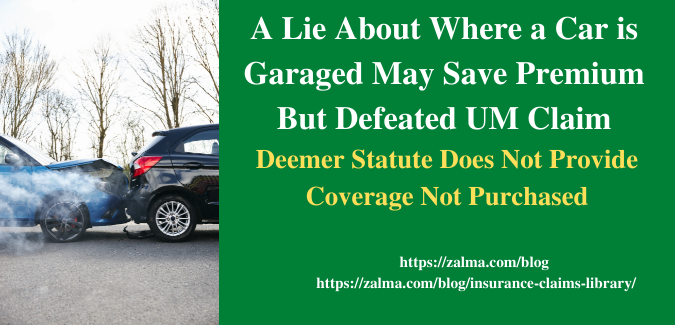Deemer Statute Does Not Provide Coverage Not Purchased
Read the full article at https://www.linkedin.com/pulse/lie-where-car-garaged-may-save-premium-defeated-um-zalma-esq-cfe and at https://zalma.com/blog plus more than 4150 posts.
Deemer statutes, like the one enacted in New Jersey, an automobile insurance company that sells insurance both in New Jersey and in other jurisdictions is deemed to have provided the minimum PIP coverage required by New Jersey law. In Juan Guiterrez-Ganan v. Allstate Insurance Company, No. A-0646-20, Superior Court of New Jersey, Appellate Division (April 1, 2022) Juan argued that the Deemer Statute compelled Allstate to provide uninsured motorist coverage.
Juan Guiterrez-Ganan was injured in an automobile accident when his car was struck by a car driven by an underinsured motorist. Plaintiff sued his insurance company, defendant Allstate Insurance Company (defendant or Allstate), seeking to obtain underinsured motorist benefits for his injuries and losses.
The trial court granted summary judgment to Allstate and dismissed his claims.
After moving to New Jersey plaintiff continued to register his car in Georgia and continued to purchase a Georgia-issued automobile insurance policy from Allstate. In his renewal application submitted in December 2015, for insurance coverage from January 2016 to July 2016, plaintiff listed his address at a street in “Savannah, Georgia.”
The trial court found that plaintiff’s Georgia insurance policy did not contain medical expense coverage required under New Jersey law. The trial court, therefore, held that plaintiff’s claims against Allstate were barred.
Under New Jersey law, plaintiff was required but failed to maintain medical expense benefits coverage. Indeed, that coverage was available to him in his Georgia policy, but he elected not to pay for it.
Plaintiff was barred from suing Allstate for underinsured or uninsured benefits seeking economic and non-economic losses stemming from the April 2016 automobile accident.
ZALMA OPINION
The action brought by the plaintiff was an insult to an insurer that paid his medical bills even though he had obtained the policy under false circumstance. Rather than pay anything Allstate should have considered rescinding the policy because it was obtained by a knowing and material fraud. The court, although it reached an obviously correct decision, should have reported the plaintiff to the New Jersey Insurance Department Fraud Division since the policy he obtained from Allstate was based on a material false statement of fact.
(c) 2022 Barry Zalma & ClaimSchool, Inc.
Subscribe to Zalma on Insurance at locals.com https://zalmaoninsurance.local.com/subscribe.
Subscribe to Excellence in Claims Handling at https://barryzalma.substack.com/welcome.
Write to Mr. Zalma at [email protected]; http://www.zalma.com; Go to Barry Zalma videos at Rumble.com at https://rumble.com/c/c-262921.





